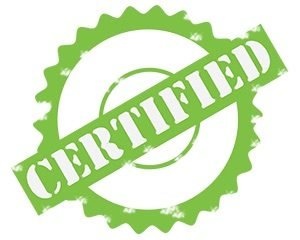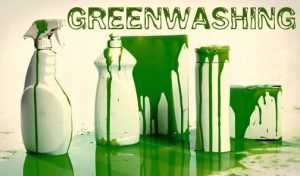Picture this: You walk into a coffee house to get your daily triple venti latte. You are faced with a choice. Do you pick the regular coffee OR the all-natural, eco-friendly coffee? You choose the latter and think, “Wow! I get my caffeine boost, I am being healthy, and helping the environment! What’s a couple extra bucks?”
As you leave the shop feeling good, you head to your favorite big box store for some shopping. You’re walking down the aisle looking for a new spray cleaner. You pick up a bottle with a green label with a fancy gold sticker that says “Certified Eco-friendly by the ABC!” It’s four dollars more expensive, but can you really put a price on your family’s health, or the health of the environment? But are either of these coffee or spray cleaner choices really better for your health or for the environment? In most cases, the answer is no. You may have fallen prey to “Greenwashing.”
Greenwashing is a method of advertising used to convince consumers that their products are healthy and environmentally friendly to boost their public image, when in actuality they are no different from other products. Companies use this to seem environmentally responsible, pander to the culture that is increasingly pro-environmentalism, and increase corporate responsibility.
The concept of greenwashing must be viewed in terms scientific validity. Are the claims well founded? Is any certification or testing performed truly measured what it is purported to measure? If not, then the claims are unreliable and misleading.
Many companies lay vague and dubious clams to “environmental stewardship,” but the labels promise more than the products can actually deliver. As consumers, we are willing to spend more money for the presumably safe, healthy and environmentally friendly products, when in reality these claims could be unsubstantiated or blatantly false. Public health officials and critics of greenwashing are now saying that greenwashing is not only a breach of advertising ethics, but can, in some instances, harm human health.
In 2009, over 2,219 products made green claims and 98% were guilty of greenwashing. Studies show that indoor cleaning products (surface sprays, bathroom disinfectants, dish soap, etc.) are the worst offenders when it comes to making baseless claims of health and sustainability. Manufacturers of cleaning products have used greenwashing to intentionally confuse or mislead consumers into thinking that the chemicals used in their products have reduced adverse health effects. For example, a detergent may advertise that it is “Phosphate Free!” while ignoring the fact that phosphates have not been used in detergents in thirty years.  According to the NIH, “People… end up buying products that don’t have the environmental or human-health performances that they expect.”
According to the NIH, “People… end up buying products that don’t have the environmental or human-health performances that they expect.”
Some companies also use self-certification as a means of tricking consumers. Manufacturers can buy certifications without meeting a certain set of standards that qualify it as healthy or environmentally friendly. This preys on subconscious processing of superficial cues, like colors and photos of flowers and nature, and causes people to automatically and subconsciously believe that this product is not “toxic.”
Learn more about methods to identify invalid claims including the Seven Sins of Greenwashing and How to Prevent Falling Prey to this advertising practice in our three part series on greenwashing. For more information about health risks of greenwashing and how to reduce your risk, contact the experts at Cogency at solutions@cogencyteam.com.

